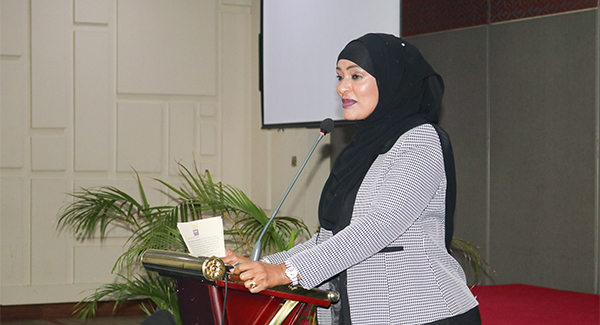STATEMENT BY THE NATIONAL GENDER AND EQUALITY COMMISSION DURING THE INTERNATIONAL ALBINISM AWARENESS DAY (IAAD) TO BE COMMEMORATED ON 13TH JUNE 2025
The National Gender and Equality Commission (NGEC) joins Persons with Albinism (PWAs) in Kenya and the world at large in observing the International Albinism Awareness Day (IAAD) 2025, observed annually on the 13th Day of June. The observance of the day aims to create awareness of the human rights situation of persons with albinism to fight against discrimination and stigma as well as focus on other health issues that are brought about by albinism. The theme for IAAD 2025 is “Demanding our rights: Protect our skin, Preserve our lives”.
Globally, persons with albinism (PWAs) continue to face multiple and intersecting human rights violations, including discrimination, marginalization, and violence fueled by harmful cultural beliefs. As of September 2024, over 730 attacks and 248 killings of PWAs had been reported across 31 countries. Additionally, lack of access to affordable sunscreen and quality healthcare exposes PWAs to a heightened risk of life-threatening skin cancers and visual impairments.Despite the adoption of IAAD by the United Nations in 2014 and growing international recognition, the rights of persons with albinism remain inadequately protected in many parts of the world.
In Kenya, the 2019 national census recorded 9,729 persons with albinism, representing about 0.02% of the population. While Kenya has made commendable progress in policy, health, and public awareness, PWAs continue to experience disproportionate barriers in education, employment, and healthcare. Albinism is officially recognized as a disability, and Kenya’s Constitution guarantees the rights of persons with disabilities.
Kenya has demonstrated a notable commitment to advancing the rights of persons with albinism through a range of interventions. The National Albinism Sunscreen Support Program, administered through the NCPWD, provides free sunscreen lotion, lip balm, after-sun cream and related skin-care products to persons with albinism throughout the country. In education, inclusive policies promote the integration of learners with albinism into mainstream schools, complemented by scholarships and class retention programmes.
On the legislative front, Kenya has ratified the UN Convention on the Rights of Persons with Disabilities (CRPD), developed a National Action Plan on Albinism (2023–2028) and notably, enacted the Persons with Disabilities Act, 2025. This landmark legislation strengthens the legal and institutional framework for promoting the rights of persons with disabilities. Public awareness about albinism has improved and civil society advocacy and media campaigns on the subject have expanded. Individuals with albinism have assumed leadership roles and a general shift in attitudes. We applaud the Government for all these efforts.
Despite these gains, persons with albinism in Kenya continue to face persistent challenges. These include inconsistent access to healthcare and sun protection, particularly in hard-to-reach and marginalized areas; stigma, bullying, and social exclusion, especially within school environments and rural communities; economic marginalization and high unemployment rates, often exacerbated by discrimination and health-related constraints; underrepresentation in leadership and limited participation in decision-making processes; and ongoing security concerns, including fear of ritual attacks and hate speech. Addressing these challenges requires urgent, coordinated, and sustained action across all sectors.
As we commemorate this day, the NGEC recommends considerations of the following actions:
- Accelerate full implementation of the National Action Plan on Albinism (2023–2028) and ensure adequate budgetary support.
- Operationalize and monitor the enforcement of the Persons with Disabilities Act, 2025
- Integrate albinism-specific healthcare services including dermatology, vision care, and free or subsidized sunscreen into the Social Health Insurance Fund (SHIF) - Add sunscreen to the WHO Essential Medicines List and national essential drug list, Recognize that the failure to prevent skin cancer related deaths – which are foreseeable, yet preventable – in persons with albinism constitutes not only a violation of the right to health, but also the right to life
- Enhance inclusive education by equipping schools with assistive devices, training teachers, and promoting safe learning environments for children with albinism.
- Ensure data on skin cancer prevalence is disaggregated to reflect the number of persons with albinism affected by skin cancer.
- Expand national awareness campaign to debunk myths and end stigma against PWAs.
- Ensure participation and inclusion of PWAs in leadership and decision-making at all levels.
The National Gender and Equality Commission remains steadfast in its commitment to protect, promote, and fulfil the rights of persons with albinism in Kenya.
“Albinism is not a disease; it’s just a different way of being.” “Albinism is not a choice, but acceptance is.”
[1] Under the Same Sun. (2024, September 2). Reported attacks of persons with albinism. https://underthesamesun.com/content/attacks
[2] Human Rights Watch. (2025, April 17). Letter supporting the inclusion of SPF50+ broad-spectrum sunscreen in the WHO Model List of Essential Medicines. https://www.hrw.org/news/2025/04/17/human-rights-watch-letter-supporting-inclusion-spf50-who-list-essential-medicines and Global Albinism Alliance. (2024). Skin cancer in persons with albinism. https://www.albinismalliance.org/skin-cancer
HON. REHEMA JALDESA
NATIONAL GENDER AND EQUALITY COMMISSION


Comments